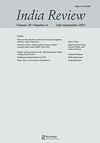The sociological conception of corruption: a case study of Karnataka Lokayukta
IF 0.5
3区 社会学
Q3 AREA STUDIES
引用次数: 0
Abstract
ABSTRACT Modern states have to reckon with the problem of corruption because of its derailing influence on the functioning of government. This paper argues that state–society relations frame the context in which the incidence of corruption and the state’s response to corruption become mutually reinforcing processes. We define this as “structures of irresolution” wherein an idealized abstract image of the state is constructed and corruption is blamed upon individual aberrations rather than the deviant nature of the state itself. We apply this framework to examine the functions of Karnataka Lokayukta, an anticorruption institution in India. Our data comes from the Annual Reports of this Lokayukta between 1987 and 2015 and corruption cases from Crime in India statistics. Our analysis shows that Lokayukta targeted officials disproportionately from lower sections of the bureaucracy. We recommend decentralized accountability mechanisms that redefine the relations between the individual, institutions, and the state to combat corruption effectively.腐败的社会学概念:以卡纳塔克邦为例
现代国家不得不正视腐败问题,因为腐败对政府运作的影响越来越大。本文认为,国家与社会的关系构成了这样一种背景,在这种背景下,腐败的发生和国家对腐败的反应成为相互加强的过程。我们将其定义为“不确定的结构”,在这种结构中,国家的理想化抽象形象被构建起来,腐败被归咎于个人的失常,而不是国家本身的越轨性质。我们运用这一框架来考察印度反腐败机构卡纳塔克邦的职能。我们的数据来自1987年至2015年的Lokayukta年度报告和印度犯罪统计中的腐败案件。我们的分析表明,Lokayukta针对的官员不成比例地来自官僚机构的下层。我们建议建立分散的问责机制,重新定义个人、机构和国家之间的关系,以有效地打击腐败。
本文章由计算机程序翻译,如有差异,请以英文原文为准。
求助全文
约1分钟内获得全文
求助全文

 求助内容:
求助内容: 应助结果提醒方式:
应助结果提醒方式:


